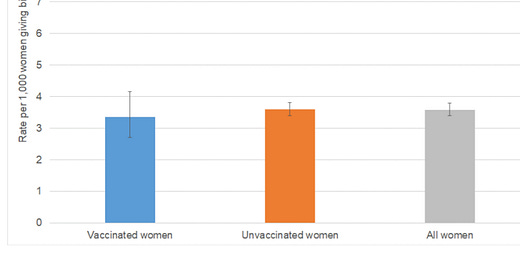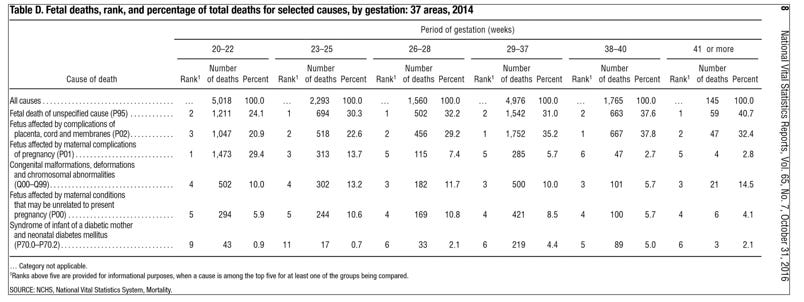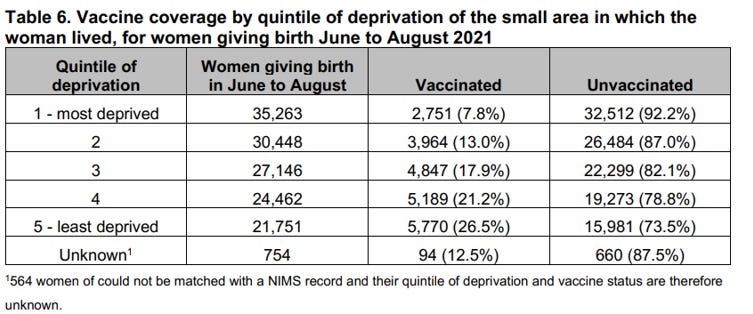***Part 2 addresses some concerns
***Part 3 for some updated estimates
Many of my posts over the last six weeks or so have involved analyzing the UK Weekly Vaccine Surveillance Report. While my focus has been looking at cases, hospitalizations, and deaths among different age cohorts and vaccine status groups, I would like to focus this post on a section of the report they added in Week 47, namely the section that discusses vaccination and pregnancy. I will do my best to present my analysis of the data as I am able to interpret it, not trying to be an alarmist, and adding limitations as I see them. Peer review in the comments is most welcome.
Safe to say the general theme within the report is to encourage pregnant women to get vaccinated. To that end, the report includes data to compare rates of stillborn births, premature births, and low weight births between vaccinated women and unvaccinated women. It is clear, the data is intended to show safety. However, it’s not clear to me that the data supports that.
Focus of this post will be on stillborn rates. This is the chart in the report that summarizes the findings:
To the eye, the rate of stillborn births among Vaccinated and Unvaccinated women looks nearly identical. In fact, the rate among the Vaccinated is 3.35 per 1,000, while Unvaccinated is 3.60 (~7.5% higher). Good news, right? I contend this may point to something troubling and certainly worthy of more investigation.
A couple of pieces of data to enter the conversation:
1. The majority (71.5%) of vaccinations in pregnant women occurred in the third trimester. From Week 51 UK Report:
2. Roughly half (47%) of fetal deaths after week 20 (to my knowledge, this is synonymous with stillborn death) occur before the 3rd trimester (weeks 20-22 + weeks 23-25):
Source: https://www.cdc.gov/nchs/data/nvsr/nvsr65/nvsr65_07.pdf
Combined, I contend this implies that rather than having a stillborn rate on par with Unvaccinated women, Vaccinated women (all other factors being equal) should have a stillborn rate that is lower. Why? Well, one thing we know about women included in this data who received their vaccination in the 3rd trimester is that they did not have a stillborn birth before the 3rd trimester (if they had, they would have been counted as an Unvaccinated stillborn birth). Therefore, women vaccinated in their 3rd trimester (71% of all vaccinated women) have already passed much of the risk of a stillborn (47% of the risk) by reaching their 3rd trimester. I will assume women vaccinated before their 3rd trimester face the full risk of a stillborn birth (conservative assumption as depending on how early they were vaccinated, they may have already gotten past a significant amount of risk as well). What we are seeing here is the possibility that the numbers presented suffer from the statistical principle of Survivorship Bias.
What might be a reasonable expected risk of stillborn birth in Vaccinated women in relation to the risk faced by Unvaccinated women? Let R be the rate of stillborn births among Unvaccinated women during an entire pregnancy. Vaccinated women should then face the following risk:
[28.5% (women vaccinated before 3rd trimester) x R] + [71.5% (women vaccinated during 3rd trimester) x R x 53% (fraction of stillbirth expected in 3rd trimester)] = 66% R
For those less comfortable with equations, here is the explanation:
We assume the 28.5% of vaccinated women who were vaccinated before the 3rd trimester face the same risk of stillborn as unvaccinated women. We are calling that risk R.
For the 71.5% of vaccinated women who were vaccinated in the 3rd trimester, they have already moved past 47% of the risk of stillborn, so their risk should only be 53% of R.
Combing the two (a weighted average), means the total risk for Vaccinated women (all else equal) should have been ~66% of R.
This means that given when stillborn births tend to occur in a pregnancy and when women are getting vaccinated in pregnancy, all other factors being equal, the rate of stillborn in vaccinated women should have been lower than unvaccinated women by ~1/3rd. Rough approximation would say that instead of being ~7.5% lower (**corrected) as we see in the report, it potentially should have been ~33% lower, meaning a potential 25% (**corrected) increased risk to pregnant women of stillbirth from taking the vaccine.
LIMITATION
I’ve stated a couple of times that this analysis holds with “all other factors being equal”. The most significant factor that I don’t believe we have sufficient data to analyze completely is age. We know from the UK report that the vaccination rates in pregnant women are higher among the older women than the younger women:
We also know from the previously linked report that fetal mortality rates are higher among the older groups of pregnant women:
What we don’t know is if the age factor is enough to explain the apparent 40% increase in stillborn rate among Vaccinated women. The largest number of pregnancies are in the 30-34 age group which actually has the lowest fetal mortality rate. A higher percentage of women 35 and older are vaccinated & they have higher fetal mortality rates, but there are fewer pregnancies in that group. Very hard to untangle this completely given the data we have.
To complicate this further, on the other side of the coin, vaccination rates are higher among women in more advantaged areas & we would presume those women tend to have lower stillborn rates than women living in Deprived areas:
Because I don’t have access to the full set of data, I can’t say confidently that the data points to vaccines being a risk to pregnant women. What I can say is that the high level numbers provided in the UK report are not enough to convince me there is no danger, and I think there is plenty of reason to investigate further to see if concern is warranted. At minimum, people with access to all the data should be using data on when in the pregnancy stillborns are occurring, as well as age and socio-economic status of the women to give a fuller picture of the true risk (if any).
Addendum: Note this same sort of bias is almost certainly impacting the numbers for premature births. Think of it this way, Vaccinated women have less opportunity to deliver significantly prematurely just given then fact that they tend to be vaccinated late in pregnancy.










I can't believe we have to have a polite discussion about whether experimental vaccines given in pregnancy is a good idea or not.
It’s amazing to me that obstetricians (and midwives) haven’t stepped back and looked at the actual data before blindly parroting the “experts” and the drive to vaccinate all pregnant women. 🤔